Reminiscing
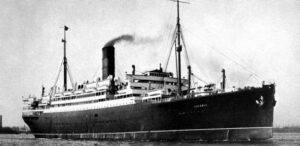 Probably one of the deadliest weapons the Nazis ever created, was the German U-Boat. With their code system, it was hard to track a U-boat, and so they snuck up on ships and sunk them. The U-boat wasn’t a ship. It was a submarine, so the ships didn’t know it was there until they saw the torpedo coming at them…if they saw it coming. Often, they didn’t see it coming, it just hit, and it was over. On September 12, 1942, a U-boat sunk the British troop ship, the RMS Laconia, killing more than 1,400 men. The commander of the German sub, Captain Werner Hartenstein, then realized that Italians POWs were among the passengers.
Probably one of the deadliest weapons the Nazis ever created, was the German U-Boat. With their code system, it was hard to track a U-boat, and so they snuck up on ships and sunk them. The U-boat wasn’t a ship. It was a submarine, so the ships didn’t know it was there until they saw the torpedo coming at them…if they saw it coming. Often, they didn’t see it coming, it just hit, and it was over. On September 12, 1942, a U-boat sunk the British troop ship, the RMS Laconia, killing more than 1,400 men. The commander of the German sub, Captain Werner Hartenstein, then realized that Italians POWs were among the passengers.
Like many other cruise ships, the Laconia, a former Cunard White Star ship was put to use to transport troops, including prisoners of war during World War II. RMS Laconia was in the South Atlantic bound for England when 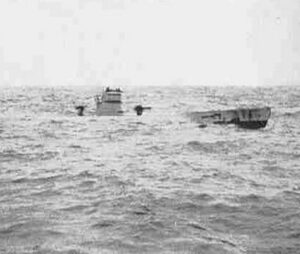 it encountered U-156. The sub attacked, sinking the troop ship and imperiling the lives of more than 2,200 passengers. But as Hartenstein, the sub commander, was to learn from survivors he began taking onboard, among those passengers were 1,500 Italian POWs. Of course, it wouldn’t look good for Hartenstein to be responsible for endangering the lives of so many of his fellow Axis members, so he quickly put out a call to an Italian submarine and two other German U-boats in the area to help rescue the survivors.
it encountered U-156. The sub attacked, sinking the troop ship and imperiling the lives of more than 2,200 passengers. But as Hartenstein, the sub commander, was to learn from survivors he began taking onboard, among those passengers were 1,500 Italian POWs. Of course, it wouldn’t look good for Hartenstein to be responsible for endangering the lives of so many of his fellow Axis members, so he quickly put out a call to an Italian submarine and two other German U-boats in the area to help rescue the survivors.
Upon hearing of the incident, one French and two British warships rushed to the scene to aid in the rescue. The German subs immediately informed the Allied ships that they had surfaced for humanitarian reasons. The Allies wisely assumed it was a trap. With that, an American B-24 bomber, the Liberator, flying from its South Atlantic base on Ascension Island, saw the German sub and bombed it…despite the fact that Hartenstein had draped a Red Cross flag prominently on the hull of the surfaced sub. The U-156, damaged by the air attack, immediately 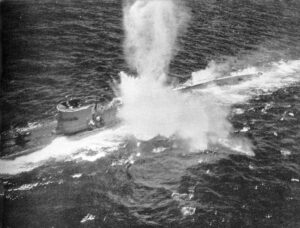 submerged. Admiral Karl Donitz, supreme commander of the German U-boat forces, had been monitoring the rescue efforts. He ordered that “all attempts to rescue the crews of sunken ships…cease forthwith.” Consequently, more than 1,400 of the RMS Laconia’s passengers, which included Polish guards and British crewmen, drowned. This marked the end of taking POWs from torpedoed ships. There were often men who survived these attacks, but they were given no chance of survival after the attack. I suppose war is war, and death is expected. On March 8, 1943, U-156 was sunk by PBY “Catalina” aircraft from Patrol Squadron Fifty-Three (VP-53), in the Atlantic Ocean, east of Barbados. There were five survivors from U-156.
submerged. Admiral Karl Donitz, supreme commander of the German U-boat forces, had been monitoring the rescue efforts. He ordered that “all attempts to rescue the crews of sunken ships…cease forthwith.” Consequently, more than 1,400 of the RMS Laconia’s passengers, which included Polish guards and British crewmen, drowned. This marked the end of taking POWs from torpedoed ships. There were often men who survived these attacks, but they were given no chance of survival after the attack. I suppose war is war, and death is expected. On March 8, 1943, U-156 was sunk by PBY “Catalina” aircraft from Patrol Squadron Fifty-Three (VP-53), in the Atlantic Ocean, east of Barbados. There were five survivors from U-156.

 As we come up on 22 years since the September 11th terrorist attacks on our nation, I find myself feeling strangely shocked that the children born after the attacks are almost 22 years old. I know that is just logical, and shouldn’t be shocking at all, but it is. How can so many years have gone by since the 2,977 people from 102 countries, lost their lives in those senseless attacks? Many of those children might even be parents themselves by now. I’m sure the hole left by the dad they lost, feels massive. They have been robbed of their dad and very likely a grandpa for their children, and then of course there are all of the sons, daughters, parents, siblings, grandparents, friends and coworkers.
As we come up on 22 years since the September 11th terrorist attacks on our nation, I find myself feeling strangely shocked that the children born after the attacks are almost 22 years old. I know that is just logical, and shouldn’t be shocking at all, but it is. How can so many years have gone by since the 2,977 people from 102 countries, lost their lives in those senseless attacks? Many of those children might even be parents themselves by now. I’m sure the hole left by the dad they lost, feels massive. They have been robbed of their dad and very likely a grandpa for their children, and then of course there are all of the sons, daughters, parents, siblings, grandparents, friends and coworkers.
On September 11, 2001, nineteen terrorists took it upon themselves, and instructions of their evil leaders, and attacked a nation and a people who had done nothing to them. Hate is like that. There is no reason for it, they just look at different as something to hate. Sadly, that is the way of the world we live in. The attacks of 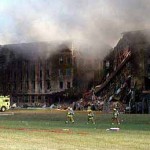
 September 11 reminded us so clearly that we must always stay alert. The evil people around us will take any opportunity to act upon their hate if the people around them are not watchful. That is also why it is so important to secure our boarders, and properly vet anyone who is to be given any kind of a visa here. These terrorists came is as “students” to learn to fly, or actually crash planes into the buildings in our nation. They were never interested in learning to land, because they had no intention of landing.
September 11 reminded us so clearly that we must always stay alert. The evil people around us will take any opportunity to act upon their hate if the people around them are not watchful. That is also why it is so important to secure our boarders, and properly vet anyone who is to be given any kind of a visa here. These terrorists came is as “students” to learn to fly, or actually crash planes into the buildings in our nation. They were never interested in learning to land, because they had no intention of landing.
We had long ago stopped our careful watch concerning hijacking planes, because we didn’t believe that hijacking was something that happened anymore…until it happened, and the attackers had our planes with no intention to take them anywhere but into destruction. We can never again afford to let our guard down. As the old saying goes, “Evil flourishes when good men do 
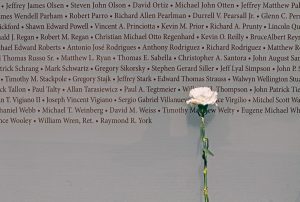 nothing.” That is so very true, and evil did flourish, because we didn’t stop it. It may be 22 years since the last attack on our nation, but we can never stop being on our guard, because the world we live in is looking for a way to take us out, and it is our job to protect those around us. We must “Never Forget” the 9-11 attacks, nor the lives we lost in that horrific attack. Continuing to pray for the families of those we lost.
nothing.” That is so very true, and evil did flourish, because we didn’t stop it. It may be 22 years since the last attack on our nation, but we can never stop being on our guard, because the world we live in is looking for a way to take us out, and it is our job to protect those around us. We must “Never Forget” the 9-11 attacks, nor the lives we lost in that horrific attack. Continuing to pray for the families of those we lost.
 If you’ve ever been to the Smoky Mountains, then you know…you know just how beautiful they are. I’ve seen them, and they are beautiful. Nevertheless, there are things about the Smoky Mountains that I didn’t know. I love history and I love ghost towns, and now I find out that there is another one in the Smoky Mountains. It’s Daisy Town, Tennessee, and it has an interesting past. It was a century ago, when Daisy Town was thriving, that the Knoxville elites flocked to the Elkmont area. Sadly, today, the abandoned summer homes of Daisy Town make up a ghost town.
If you’ve ever been to the Smoky Mountains, then you know…you know just how beautiful they are. I’ve seen them, and they are beautiful. Nevertheless, there are things about the Smoky Mountains that I didn’t know. I love history and I love ghost towns, and now I find out that there is another one in the Smoky Mountains. It’s Daisy Town, Tennessee, and it has an interesting past. It was a century ago, when Daisy Town was thriving, that the Knoxville elites flocked to the Elkmont area. Sadly, today, the abandoned summer homes of Daisy Town make up a ghost town.
Elkmont started out in the 1830s, as a logging area, and so the moving into the area, and the area began to thrive. By the early 1900s, a lumber company built a railroad to transport the logs, and with that came people too, of course. When people saw that the area was going to make them rich, the affluent people who were living in Knoxville also began to visit the mountains finding them absolutely beautiful. They started building summer homes for themselves, and Daisy Town was born. By the 1920s, Elkmont was a summer playground for the city’s well-to-do population. Of course, if you wanted to spend your summers there, you would need money, so it was really an exclusive area.
The first thing built was the Appalachian Clubhouse, which was a social hub for the prominent members of 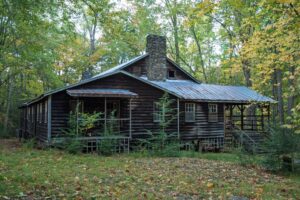 society, and with that and all the activities, came the cabins and cottages lining the one-lane road to the club. It was specifically this area that became known as Daisy Town. The club hosted dances, games, bingo, and horseshoes, through the 1920s and into the 1930s. Other areas, that had larger houses to draw the very wealthy, were nicknamed Millionaires Row and Society Hill. Nevertheless, time changes things, and even the fancy places like Daisy Town, Millionaires Row, and Society Hill have simply become the “Elkmont Ghost Town” and are nothing more than a tourist attraction for those of us who find ghost towns fascinating. It doesn’t detract from the beauty of the area, and for history buffs, like me, it probably adds to the attraction.
society, and with that and all the activities, came the cabins and cottages lining the one-lane road to the club. It was specifically this area that became known as Daisy Town. The club hosted dances, games, bingo, and horseshoes, through the 1920s and into the 1930s. Other areas, that had larger houses to draw the very wealthy, were nicknamed Millionaires Row and Society Hill. Nevertheless, time changes things, and even the fancy places like Daisy Town, Millionaires Row, and Society Hill have simply become the “Elkmont Ghost Town” and are nothing more than a tourist attraction for those of us who find ghost towns fascinating. It doesn’t detract from the beauty of the area, and for history buffs, like me, it probably adds to the attraction.
The whole decline of Daisy Town began in 1934, with the creation of the Great Smoky Mountains National Park. It didn’t happen overnight, of course, but the Elkmont area fell within the new park’s borders. The people who owned the homes weren’t forced out but were rather given a lifetime lease. Unfortunately for the families, the lease was not transferable, and as each owner died, the home was transferred to the park service. The slow end to Daisy Town and all the Elkmont vacation spots was complete by the early 1990s, leaving the park with 70 abandoned structures. Without proper care, the buildings began to decay, until all that was left was the eerie reminders of their heyday, such as is common to ghost towns.
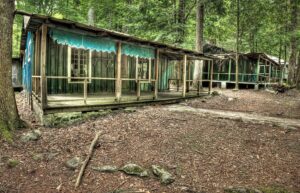
All is not lost for Daisy Town, however. While the cabins and cottages are closed to the public, you can look inside and picture happier times. The Appalachian Clubhouse was given a different fate. The park service decided to restore it so that it could be used for events. Not only that, but nineteen other structures around Elkmont are slated for renovation by 2025, something I think is very cool. It’s sad to see these parts of our history being allowed to fall apart and disappear. For now, the walk along Jakes Creek Trail will provide view of this historic little area where you can still see chimneys, walls, and other remains of 1920s cabins. It’s an area I hope to visit one day.

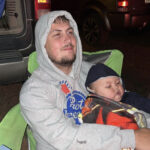 My grandson, Josh Petersen is not the little boy that lives in my memory files, but these days, he is actually a married dad of two boys, Justin and Axel (coming soon). He and his wife, Athena Petersen are so happy with life, and they are so blessed. Little did they know when they met back in middle school, that their meeting was not just by chance. They were destined to be together, and now they are, all these years later. They are both so happy with the life they have built together. Their home is filled with love and laughter…and the pitter-patter of little feet.
My grandson, Josh Petersen is not the little boy that lives in my memory files, but these days, he is actually a married dad of two boys, Justin and Axel (coming soon). He and his wife, Athena Petersen are so happy with life, and they are so blessed. Little did they know when they met back in middle school, that their meeting was not just by chance. They were destined to be together, and now they are, all these years later. They are both so happy with the life they have built together. Their home is filled with love and laughter…and the pitter-patter of little feet.
Josh works as a fire extinguisher tech, for All Out Fire, and is probably their most essential workers. He has been with them a long time, and both his boss and the customers depend on his loyalty and capabilities. He is a conscientious worker, who can always be counted on to be there when he is supposed to. His ideas have even brought the company into the modern era, so they can be competitive in this current work climate. Much has 
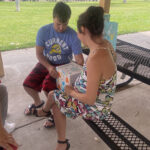 changed over the last few years, both in our lives and in the working world. A company has to be ready to compete, and Josh has helped All Out Fire stay competitive.
changed over the last few years, both in our lives and in the working world. A company has to be ready to compete, and Josh has helped All Out Fire stay competitive.
Josh has always been a soft-spoken man, with a big heart. He helped with caregiving of his great grandparents, and that qualified him for taking care of others, including his son. He is completely comfortable caring for Justin when Athena is working, or any other activity she might be engaged in. Justin loves his “Da Da” so much, and of course that was his first word…sorry Athena. I know you were hoping for “Ma Ma” but Justin decided. You know how babies are. Making up their own minds and all. Justin can be crying, but when his “Da Da” shows up, he is as happy as a clam. He starts jumping up and down and can’t wait for Josh to pick him up. I love the relationship he has with his boy.
The next chapter in Josh’s life is coming up soon. Little Axel is due on September 24th, but as we all know, that 
 is subject to change, because babies have their own schedules. Josh and Athena are already seasoned parents, but having two babies, is going to be a new step. Their babies with be “Irish Twins” because they will be born within a year of each other. Josh’s papa and I did the same thing with our daughters, Corrie Petersen (Josh’s mom) and Amy Royce (Josh’s aunt). It was a fun experience, and I know that Josh and Athena will have a lot of fun with it too. I am very excited to see what this next chapter of his life will bring. Today is Josh’s 25th birthday. Time has sure gone by fast. Happy birthday Josh!! Have a great day!! We love you!!
is subject to change, because babies have their own schedules. Josh and Athena are already seasoned parents, but having two babies, is going to be a new step. Their babies with be “Irish Twins” because they will be born within a year of each other. Josh’s papa and I did the same thing with our daughters, Corrie Petersen (Josh’s mom) and Amy Royce (Josh’s aunt). It was a fun experience, and I know that Josh and Athena will have a lot of fun with it too. I am very excited to see what this next chapter of his life will bring. Today is Josh’s 25th birthday. Time has sure gone by fast. Happy birthday Josh!! Have a great day!! We love you!!
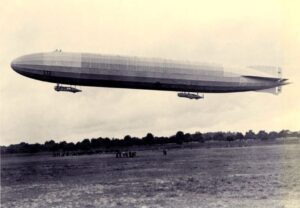 The first power-driven airship was built by a French inventor decades before the Zeppelin was developed by German inventor Ferdinand Graf von Zeppelin in 1900. The Zeppelin was a motor-driven rigid airship. The earlier airships were smaller, but Hilter always wanted the most innovative, largest, and deadliest designs of everything, with was likely the reason for the Zeppelin’s size. It was by far the largest airship ever constructed. Hitler didn’t care that size was exchanged for safety. The heavy steel-framed airships were vulnerable to explosion, because they had to be lifted by highly flammable hydrogen gas instead of non-flammable helium gas.
The first power-driven airship was built by a French inventor decades before the Zeppelin was developed by German inventor Ferdinand Graf von Zeppelin in 1900. The Zeppelin was a motor-driven rigid airship. The earlier airships were smaller, but Hilter always wanted the most innovative, largest, and deadliest designs of everything, with was likely the reason for the Zeppelin’s size. It was by far the largest airship ever constructed. Hitler didn’t care that size was exchanged for safety. The heavy steel-framed airships were vulnerable to explosion, because they had to be lifted by highly flammable hydrogen gas instead of non-flammable helium gas.
During World War I, the Zeppelins were used as bombers, and the Germans had great success bombing the British Isles with the Zeppelin over the course of 1915 and 1916. The first such  attack on London came on May 31, 1915. That bombing killed 28 people and wounded 60 more. The Germans killed a total of 550 Britons with aerial bombing by May 1916. During one such attack, on September 8, 1915, Heinrich Mathy was the commander of the famed German Zeppelin L13, bombing Aldersgate in central London. His bombs killed 22 people and causing £500,000 worth of damage.
attack on London came on May 31, 1915. That bombing killed 28 people and wounded 60 more. The Germans killed a total of 550 Britons with aerial bombing by May 1916. During one such attack, on September 8, 1915, Heinrich Mathy was the commander of the famed German Zeppelin L13, bombing Aldersgate in central London. His bombs killed 22 people and causing £500,000 worth of damage.
While Mathy was waiting on repairs to his ship, following a bombing run on August 24-25, 1916, he received word that the British had managed for the first time to shoot down a Zeppelin, using incendiary bullets. While he was a fearless pilot, Mathy saw the writing on the wall, and said, “It is only a question of time before we join 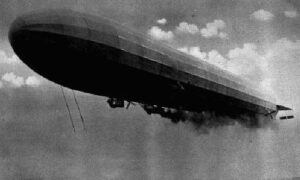 the rest. Everyone admits that they feel it. Our nerves are ruined by mistreatment. If anyone should say that he was not haunted by visions of burning airships, then he would be a braggart.” I’m sure he knew that the Zeppelin was a dangerous ship anyway, especially in a crash, but this new danger made matters much worse. As Mathy had predicted, his Zeppelin L31True to his prediction, Mathy’s L31 was shot down during a raid on London on the night of October 1-2, 1916. He is buried in Staffordshire, in a cemetery constructed by the British for the burial of Germans killed on British soil during both World Wars.
the rest. Everyone admits that they feel it. Our nerves are ruined by mistreatment. If anyone should say that he was not haunted by visions of burning airships, then he would be a braggart.” I’m sure he knew that the Zeppelin was a dangerous ship anyway, especially in a crash, but this new danger made matters much worse. As Mathy had predicted, his Zeppelin L31True to his prediction, Mathy’s L31 was shot down during a raid on London on the night of October 1-2, 1916. He is buried in Staffordshire, in a cemetery constructed by the British for the burial of Germans killed on British soil during both World Wars.
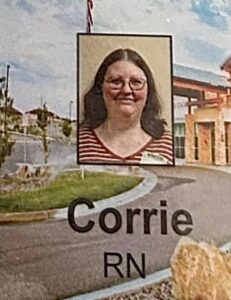
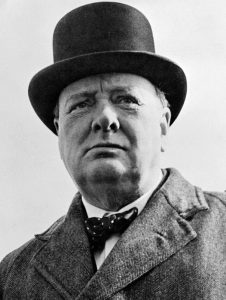 I think we all have one…a second career, or a career that could have been, had we chosen to take a different road in life. Some people actually step back from the career they have, sometimes, to pursue the one that should have been, and others simply know that they could have, if they had chosen to. I was one of those people. I spent much of my working years as an insurance agent, and a good one, I believe, but after spending thirteen years as a caregiver, I also know that I could have been a nurse, had I chosen that road. My daughter, Corrie Petersen chose to make that journey transition, and now she is a nurse, after spending those same thirteen years helping my take care of her grandparents, along with her sister, Amy Royce, children Chris and Josh, niece, Shai Royce, nephew Caalab Royce, and many other family caregivers in our Caregiving Villages, but none of the rest of us made that second career choice.
I think we all have one…a second career, or a career that could have been, had we chosen to take a different road in life. Some people actually step back from the career they have, sometimes, to pursue the one that should have been, and others simply know that they could have, if they had chosen to. I was one of those people. I spent much of my working years as an insurance agent, and a good one, I believe, but after spending thirteen years as a caregiver, I also know that I could have been a nurse, had I chosen that road. My daughter, Corrie Petersen chose to make that journey transition, and now she is a nurse, after spending those same thirteen years helping my take care of her grandparents, along with her sister, Amy Royce, children Chris and Josh, niece, Shai Royce, nephew Caalab Royce, and many other family caregivers in our Caregiving Villages, but none of the rest of us made that second career choice.
Sir Winston Leonard Spencer-Churchill was a British statesman, soldier, and writer who served as Prime Minister of the United Kingdom twice, from 1940 to 1945 during the Second World War, and again from 1951 to 
 1955. Apart from two years between 1922 and 1924, he was a Member of Parliament from 1900 to 1964 and represented a total of five constituencies. He was also a well-known war strategist, and a part of the reason that World War II ended the way that it did. One would think that he knew exactly what his one and only career was, and that he fulfilled his destiny, but he also had another career living inside of him, and some say that he missed his calling. Sir Winston Leonard Spencer-Churchill was a very talented artist. He actually painted 500 paintings, 50 of which were displayed professionally. In fact, it was Picasso, himself, who said that Sir Winston Leonard Spencer-Churchill missed his true calling, and very much could have chosen art as his career. My daughter, Amy Royce could have too, I think, as could my son-in-law, Kevin Petersen, and a number of others in my family. I have almost zero talent when it comes to art, but I am very impressed with those in my family
1955. Apart from two years between 1922 and 1924, he was a Member of Parliament from 1900 to 1964 and represented a total of five constituencies. He was also a well-known war strategist, and a part of the reason that World War II ended the way that it did. One would think that he knew exactly what his one and only career was, and that he fulfilled his destiny, but he also had another career living inside of him, and some say that he missed his calling. Sir Winston Leonard Spencer-Churchill was a very talented artist. He actually painted 500 paintings, 50 of which were displayed professionally. In fact, it was Picasso, himself, who said that Sir Winston Leonard Spencer-Churchill missed his true calling, and very much could have chosen art as his career. My daughter, Amy Royce could have too, I think, as could my son-in-law, Kevin Petersen, and a number of others in my family. I have almost zero talent when it comes to art, but I am very impressed with those in my family 
 who do.
who do.
I suppose that a second career that is never a road taken, would end up being called a “hobby” sometimes, although, I would not consider caregiving a “hobby” in any way, but art could fall into that category…as could writing, which I guess could have been a third career for me. Strangely, I don’t really consider myself to be an author, because I have never published a book. Is internet blogging of stories, publishing? Maybe. And maybe we all have many talents that could easily have turned into careers, had we decided to go down that road, or another road. Maybe, “That Second Career” isn’t really even the right title, nevertheless, it is the title.
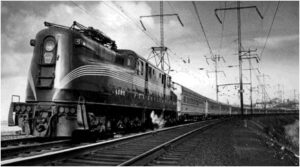 Monday, September 6, 1943, was the Labor Day holiday and the Pennsylvania Railroad company had laid on 16-car trains to accommodate the expected high demand. At 4pm, the passenger count on the premier train, the Congressional Limited was at 541 people on the 16 cars, being hauled by PRR GG1 electric locomotive number 4930, scheduled to travel nonstop from Washington’s Union Station to Pennsylvania Station in New York.
Monday, September 6, 1943, was the Labor Day holiday and the Pennsylvania Railroad company had laid on 16-car trains to accommodate the expected high demand. At 4pm, the passenger count on the premier train, the Congressional Limited was at 541 people on the 16 cars, being hauled by PRR GG1 electric locomotive number 4930, scheduled to travel nonstop from Washington’s Union Station to Pennsylvania Station in New York.
As the train reached Frankford Junction the train derailed in the Kensington neighborhood of Philadelphia, Pennsylvania, killing 79 people and injuring 117 others. As the train passed through the North Philadelphia station, everything seemed to be in order. The train was even coming in a little bit ahead of schedule. It began to slow its speed, but shortly afterward, as it passed a rail yard, workers saw flames coming from a journal box (a hot box) on one of the cars. Jumping into action, they rang the next signal tower at Frankford Junction, but unfortunately, that call came too late. Before the worker who was manning the tower could react, disaster struck as the train passed his signal tower at 6:06 pm traveling at a speed of 56 miles per hour. The journal box on the front of car #7 had seized and an axle snapped, which caught the truck and  catapulted it upwards. The car subsequently struck a signal gantry, which peeled off its roof along the line of windows “like a can of sardines.” From there everything fell apart like a house of cards. Car #8 wrapped itself around the gantry upright in a figure U. The next six cars were scattered at odd angles over the tracks, with only the last two cars remaining undamaged. The scene was one of devastation, with the bodies of the 79 dead lying scattered over the tracks.
catapulted it upwards. The car subsequently struck a signal gantry, which peeled off its roof along the line of windows “like a can of sardines.” From there everything fell apart like a house of cards. Car #8 wrapped itself around the gantry upright in a figure U. The next six cars were scattered at odd angles over the tracks, with only the last two cars remaining undamaged. The scene was one of devastation, with the bodies of the 79 dead lying scattered over the tracks.
Because the derailment happened during wartime, there were a number of servicemen onboard who were on leave. The men immediately jumped into action, helping the injured. Workers from the nearby Cramp’s shipyard arrived with acetylene torches to cut open cars to rescue the injured. That is a long process, that took until the following morning. The rescue work was directed by Mayor Bernard Samuel. The gruesome work of removing the dead was not completed until 24 hours after the accident. The Congressional Limited traveled between Washington DC and New York City, normally making one stop in Newark, New Jersey, covering the 236 miles in 3½ hours at speeds up to 80 miles per hour, which seems fast for the time. All the deaths occurred in cars #7 and #8, and 117 other passengers were injured, some seriously. There were survivors, of course, one of whom was Chinese author Lin Yutang.

The inquiry centered on the journal box on car #7 as the cause of the accident. The railroad mechanics who had inspected and lubricated the box earlier that day swore it had been in good order. Normal practice was for signal towermen to watch passing train wheels for signs of problems and for train crew to look back as trains rounded curves. Somehow, the overheated and eventually burning journal box was missed. How that happened was never explained. Did the towermen and train crew simply become lax in their duties, thinking that nothing ever happened on their train, were they possibly over tired that day, or were the just busy with other tasks. These are questions we will never have answers for, unfortunately.

 When I first met, my husband, Bob Schulenberg’s aunt, Pearl Hein, I liked her immediately. She felt like my own aunt, even before we were married, and she became my aunt too. It was just the natural transition of it. Pearl was so welcoming and easy to get along with. I honestly don’t know anyone who didn’t love her. Bob and I used to go to Forsyth, Montana where his grandparents, aunts, uncles, and cousins lived…most of them anyway. Those who don’t live there, started out in that area. So, we tried to keep our girls, Corrie Petersen and Amy Royce, connected with that part of the family. Pearl and Uncle Eddie were a big part of those visits.
When I first met, my husband, Bob Schulenberg’s aunt, Pearl Hein, I liked her immediately. She felt like my own aunt, even before we were married, and she became my aunt too. It was just the natural transition of it. Pearl was so welcoming and easy to get along with. I honestly don’t know anyone who didn’t love her. Bob and I used to go to Forsyth, Montana where his grandparents, aunts, uncles, and cousins lived…most of them anyway. Those who don’t live there, started out in that area. So, we tried to keep our girls, Corrie Petersen and Amy Royce, connected with that part of the family. Pearl and Uncle Eddie were a big part of those visits.
In those days, Pearl was working at the IGA (a grocery store) and honestly, I think the place would have fallen apart without her. For many years she was a fixture in the place, but now she is retired and gets to spend her 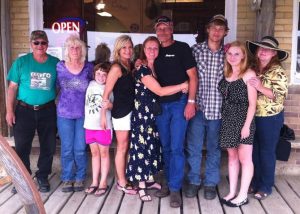
 time doing the things she wants to do. It hasn’t been exactly what she had expected or hoped, because of the loss of her husband, Eddie and then three months later, her son, Larry, but she is slowly coming back to feeling more like herself. These days, she spends some of her time visiting her daughter, Kim Arani and son-in-law, Michael Arani in Texas, and she enjoys that. Sometimes a change of scenery is just what is needed to perk a person up, and mother/daughter time is nice too.
time doing the things she wants to do. It hasn’t been exactly what she had expected or hoped, because of the loss of her husband, Eddie and then three months later, her son, Larry, but she is slowly coming back to feeling more like herself. These days, she spends some of her time visiting her daughter, Kim Arani and son-in-law, Michael Arani in Texas, and she enjoys that. Sometimes a change of scenery is just what is needed to perk a person up, and mother/daughter time is nice too.
Pearl has always had a heart for people. She tries to keep in touch with those closest to her, either by phone or text, and it is always appreciated. We are all busy in life, and so just a periodic text can be an uplifting text can be a bright spot in the day. Pearl still has family in the Forsyth area, and she enjoys getting together with them when she can. She and her sister, Rosalie 
 Steinbach were always close. They helped each other with the care of their parents, and I know their parents were grateful. Caregiving is a tough job, and Pearl knows that better than most people. Pearl is such a loving and caring person, and I’m sure that is why I felt drawn to her so much. She never thinks of herself, always others. She wants to make sure that everyone has what they need to feel comfortable and happy. That is just her nature. Everyone else, above self. That’s Pearl. Today is Pearl’s 74th birthday. Happy birthday Pearl!! Have a great day!! We love you!!
Steinbach were always close. They helped each other with the care of their parents, and I know their parents were grateful. Caregiving is a tough job, and Pearl knows that better than most people. Pearl is such a loving and caring person, and I’m sure that is why I felt drawn to her so much. She never thinks of herself, always others. She wants to make sure that everyone has what they need to feel comfortable and happy. That is just her nature. Everyone else, above self. That’s Pearl. Today is Pearl’s 74th birthday. Happy birthday Pearl!! Have a great day!! We love you!!
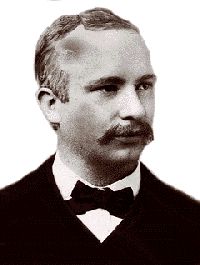 Federal holidays are celebrated for a number of reasons. Labor Day is a federal holiday in the United States celebrated on the first Monday in September. PJ McGuire, Vice President of the American Federation of Labor, is frequently credited as the father of Labor Day in the United States. The day was designed to honor and recognize the American labor movement, as well as the works and contributions of laborers to the development and achievements of the United States. Of course, many people simply look at these “three-day weekend” holidays as a great day to go out of town, sleep in on a normal workday, barbecue, or play golf or some other sport. That wasn’t exactly the plan with these, but many of them do have special events attached to them, such as parades or other celebrations.
Federal holidays are celebrated for a number of reasons. Labor Day is a federal holiday in the United States celebrated on the first Monday in September. PJ McGuire, Vice President of the American Federation of Labor, is frequently credited as the father of Labor Day in the United States. The day was designed to honor and recognize the American labor movement, as well as the works and contributions of laborers to the development and achievements of the United States. Of course, many people simply look at these “three-day weekend” holidays as a great day to go out of town, sleep in on a normal workday, barbecue, or play golf or some other sport. That wasn’t exactly the plan with these, but many of them do have special events attached to them, such as parades or other celebrations.
Labor Day began in the late 19th century, with the first Labor Day being Tuesday, September 5, 1887. As the trade union and labor movements grew, trade unionists proposed that a day be set aside to celebrate labor. “Labor Day” was promoted by the 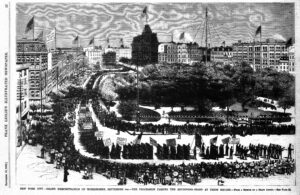 Central Labor Union and the Knights of Labor, which organized the first parade in New York City. Still, it was not celebrated everywhere at that time. In 1887, Oregon was the first state of the United States to make it an official public holiday. Labor Day didn’t become an official federal holiday, until 1894, when thirty states in the US officially celebrated Labor Day. Of course, these holidays didn’t get changed to “Monday Holidays” until the enactment of the Uniform Monday Holiday Act on enacted June 28, 1968. At that time, that made Washington’s Birthday and Memorial Day, as well as Columbus Day permanently on a Monday.
Central Labor Union and the Knights of Labor, which organized the first parade in New York City. Still, it was not celebrated everywhere at that time. In 1887, Oregon was the first state of the United States to make it an official public holiday. Labor Day didn’t become an official federal holiday, until 1894, when thirty states in the US officially celebrated Labor Day. Of course, these holidays didn’t get changed to “Monday Holidays” until the enactment of the Uniform Monday Holiday Act on enacted June 28, 1968. At that time, that made Washington’s Birthday and Memorial Day, as well as Columbus Day permanently on a Monday.
Of all the holidays that are celebrated on Mondays, Labor Day is probably the one that really is somewhat designed for a “three-day weekend” kind of celebration. We were, after all celebrating workers and all they had 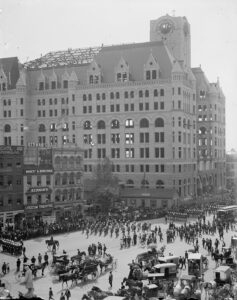 accomplished. When Labor Day was proposed, there was disagreement among labor unions about when a holiday celebrating workers should be. Some people advocated for continued emphasis of the September march-and-picnic date, while others wanted the designation of the more politically charged date of May 1. If you ask me, a May 1st picnic day has a much greater chance of getting rained out, than a September date, but that’s just my opinion. In the end, the September date won out, and now Labor Day is often viewed the “unofficial end of summer” because it marks the end of the cultural summer season. Many take their two-week vacations during the two weeks ending Labor Day weekend. Many fall activities, such as school and sports (particularly football), begin about this time. I’m not sure how many people really think about the labor side of the holiday at all. Nevertheless, they all enjoy the three-day weekend, and all the fun it includes.
accomplished. When Labor Day was proposed, there was disagreement among labor unions about when a holiday celebrating workers should be. Some people advocated for continued emphasis of the September march-and-picnic date, while others wanted the designation of the more politically charged date of May 1. If you ask me, a May 1st picnic day has a much greater chance of getting rained out, than a September date, but that’s just my opinion. In the end, the September date won out, and now Labor Day is often viewed the “unofficial end of summer” because it marks the end of the cultural summer season. Many take their two-week vacations during the two weeks ending Labor Day weekend. Many fall activities, such as school and sports (particularly football), begin about this time. I’m not sure how many people really think about the labor side of the holiday at all. Nevertheless, they all enjoy the three-day weekend, and all the fun it includes.
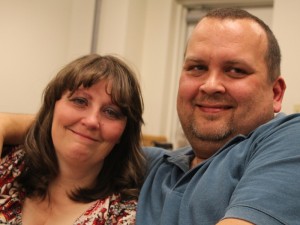
 For six years now, my son-in-law, Kevin Petersen, who is married to my daughter, Corrie Petersen, has been truly the wind beneath her wings. Corrie has been going to college to get her Batchelor of Science in Nursing degree (BSN), and since the Guiness Book of World Records calls that the hardest degree to get (I fully agree with that assessment, by the way), she has truly needed that wind beneath her wings. In addition to going to school for her degree, Corrie was also working fulltime as a CNA. Kevin was her cheerleader, chef, housekeeper, shoulder to cry on, advisor, and her encouragement when she didn’t think she could go on. While these things are admirable, they often go unnoticed by the rest of the world. While they are all cheering the accomplishments of the student, they tend to forget that support person who is always there in the background to keep that student from stumbling and falling. Nevertheless, Corrie needed Kevin to be there for her, and he was totally dedicated to her and her every need.
For six years now, my son-in-law, Kevin Petersen, who is married to my daughter, Corrie Petersen, has been truly the wind beneath her wings. Corrie has been going to college to get her Batchelor of Science in Nursing degree (BSN), and since the Guiness Book of World Records calls that the hardest degree to get (I fully agree with that assessment, by the way), she has truly needed that wind beneath her wings. In addition to going to school for her degree, Corrie was also working fulltime as a CNA. Kevin was her cheerleader, chef, housekeeper, shoulder to cry on, advisor, and her encouragement when she didn’t think she could go on. While these things are admirable, they often go unnoticed by the rest of the world. While they are all cheering the accomplishments of the student, they tend to forget that support person who is always there in the background to keep that student from stumbling and falling. Nevertheless, Corrie needed Kevin to be there for her, and he was totally dedicated to her and her every need.
Kevin often set aside his own goals and dreams to help Corrie meet her goals, dreams…and deadlines. That meant no vacations for the past six years. Corrie’s school went year-round, so there were no real breaks. Kevin  took care of things on the home front…the pets, cars, house, and meals. He kept things quiet during the days when she had to sleep, because she worked all night. He spent many a night and day alone, because she had to study. Kevin’s support of my daughter was the ultimate show of love, and it makes me very proud of the man she married. Kevin and Corrie love to go camping, but over the last six years, there wasn’t really any time to do that. In addition to everything else going one, Kevin and Corrie had 3 grandchildren (2 more on the way) and their two sons get married, during those six years. Life doesn’t get more hectic than what these two wonderful people were going through, and I know from hectic times in my own life…you can barely think straight when you have everything going on that Corrie had going on. Nevertheless, Kevin was there…holding her hand and more importantly, holding her up.
took care of things on the home front…the pets, cars, house, and meals. He kept things quiet during the days when she had to sleep, because she worked all night. He spent many a night and day alone, because she had to study. Kevin’s support of my daughter was the ultimate show of love, and it makes me very proud of the man she married. Kevin and Corrie love to go camping, but over the last six years, there wasn’t really any time to do that. In addition to everything else going one, Kevin and Corrie had 3 grandchildren (2 more on the way) and their two sons get married, during those six years. Life doesn’t get more hectic than what these two wonderful people were going through, and I know from hectic times in my own life…you can barely think straight when you have everything going on that Corrie had going on. Nevertheless, Kevin was there…holding her hand and more importantly, holding her up.
Now that Corrie’s schooling is finished, and she is working in her dream career…nursing, things have finally settled down. Don’t get me wrong when I say that Kevin is done with the schooling support, because that in no way means that his “support team” duties are over. Those will most likely always be there, because sometimes in nursing, you lose a patient, or one has an outcome that leaves the permanently disabled, or sometimes the fight for the life of a patient is just a difficult one…even when you win. Those are the times when you need your support team a lot. I know that Corrie will always have that great support team, because she has Kevin…the wind beneath her wings, and that will make her road so much easier. Still, the “wind beneath her wings” duties have settled down some, so Kevin and Corrie have been able to go camping twice this summer. They have also had time for a leisurely dinner here and there. They finally have time to be a couple again, and that has been 
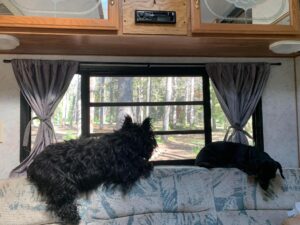 such a blessing for them…and a blessing for this mom and mother-in-law to watch, because I love these “kids” who will always be my “kids” so much, and I want their married life to be filled with every blessing God has to offer them…including a few moonlit nights by the campfire. They deserve so much happiness, and I’m glad they are getting just that. Today is Kevin’s birthday. Happy birthday Kevin, and thanks for taking such good care of my daughter!! Have a great day!! We love you!!
such a blessing for them…and a blessing for this mom and mother-in-law to watch, because I love these “kids” who will always be my “kids” so much, and I want their married life to be filled with every blessing God has to offer them…including a few moonlit nights by the campfire. They deserve so much happiness, and I’m glad they are getting just that. Today is Kevin’s birthday. Happy birthday Kevin, and thanks for taking such good care of my daughter!! Have a great day!! We love you!!

